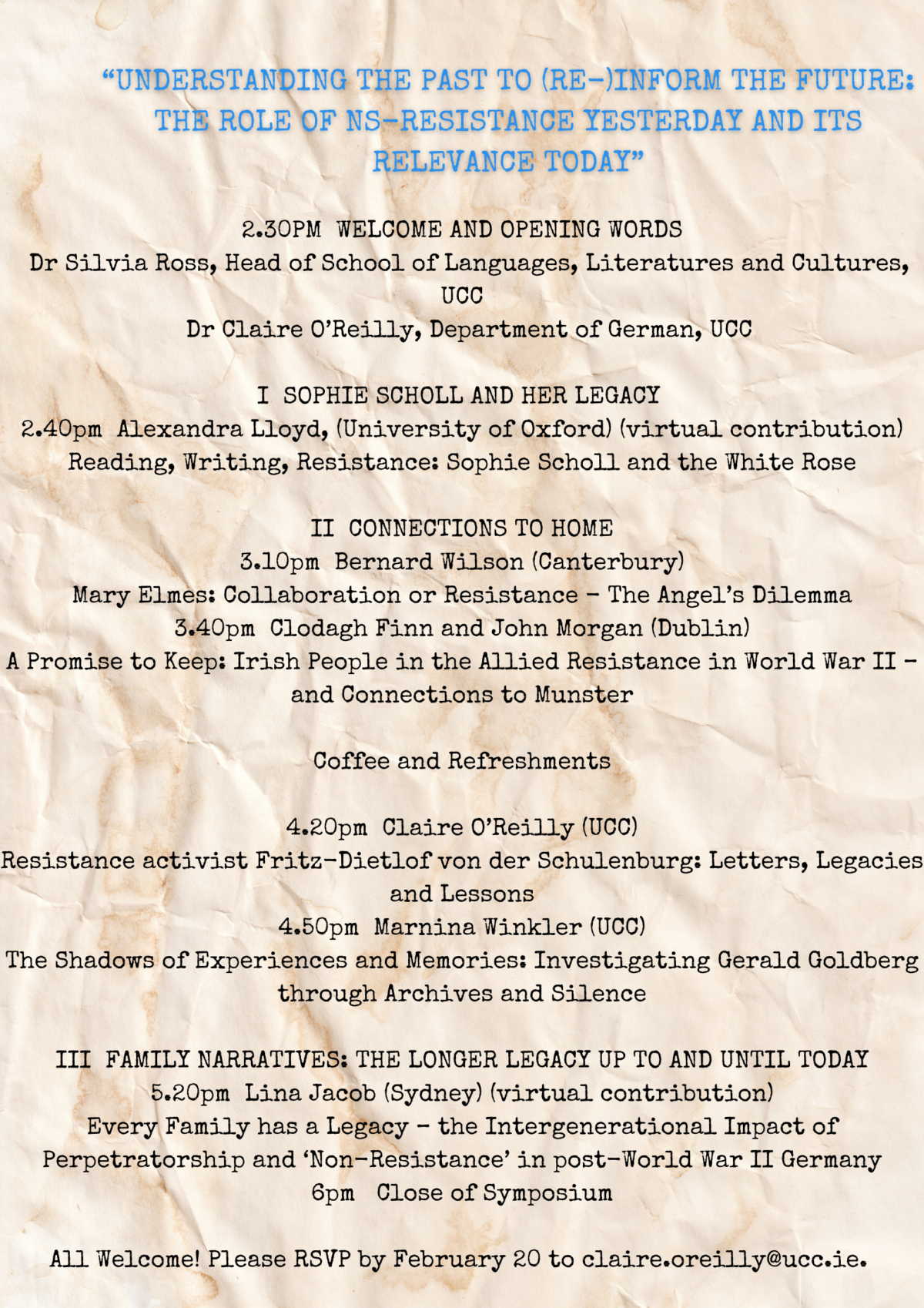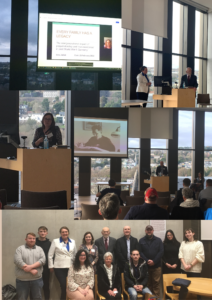Understanding the Past to (re-)Inform the Future:
The role of NS-Resistance yesterday and its Relevance today
February 23, 2023
Dora Allman Lecture Room, University College Cork
The 22nd of February 2023, marking the 80th anniversary of Sophie Scholl’s death, was the decisive starting point for this symposium, organised by Dr Claire O’Reilly, Department of German, entitled ‘Understanding the Past to (re-)Inform the Future: The role of NS-Resistance yesterday and its Relevance today’.
Sophie Scholl was a German student and an anti-Nazi political activist within the White Rose resistance group, and with this in mind, the aim of the symposium was: To commemorate firstly the important voice of resistance activists in their varied roles, and secondly, to move the discussion closer to home by exploring possible links with Ireland, and with Cork, more specifically.
The day commenced with Opening Words by Dr Silvia Ross, Head of the School of Languages, Literatures and Cultures, and her words set a very moving scene of how the act of recounting key figures, such as Sophie Scholl and Mary Elmes, contribute to ongoing and necessary intergenerational dialogue around the painful legacy of the Nazi regime and the Holocaust. Canterbury-based Bernard Wilson, now in his 90th year, brought history alive as he spoke about his discoveries while in the South of France and his subsequent research, which first brought evidence that Cork-born Mary Elmes had saved Jewish children from deportation to NS-concentration camps at great risk to her own life. One of these children, Professor Ronald Friend of Portland Oregon, presented this information to Yad Vashem in Jerusalem, resulting in Mary’s posthumous honour as “Righteous among the Nations” in 2014.
Clodagh Finn (author of “A Time to Risk All, the incredible untold story of Mary Elmes” (2017) and “Through Her Eyes: a new History of Ireland in 21 Women” (2019)), together with lawyer-researcher John Morgan, spoke about their ongoing research on Irish contributions to Holocaust resistance in advance of their monograph being published (expected in late 2024). Dr Alexandra Lloyd, from the University of Oxford, held the audience captive with her paper on Sophie Scholl and the White Rose, based on her recent books “Defying Hitler – The White Rose Pamphlets” (Bodleian Library Publishing, 2022), and “The White Rose: Reading, Writing, Resistance” (Oxford, 2019). Dr Claire O’Reilly, Department of German, discussed the person of Fritz-Dietlof von der Schulenburg and his role in NS-resistance, and traced the subsequent link to Ireland through his daughter Charlotte’s unpublished letters. Schulenburg, who has been described by Historian Hans Mommsen as “the inner driving force of the conspiracy” (Heinemann, 1990: XI), was hanged on July 20, 1944, for his part in the resistance of Nazi Germany, however, he is not widely discussed or known about in Ireland, as, for example Claus von Stauffenberg. PhD-Candidate, Marina Winkler, Department of German, took the audience on a fascinating journey into archival materials and how they can unearth past lives and untold memories, leading with the example of the archival collection of Cork’s first and only Jewish Lord Mayor, Gerald Goldberg. The final paper of the day sought to explore and unwrap the consequences of the Holocaust on family narratives today. Lina Jakob, author of “Echoes of Trauma and Shame in German Families: The Post–World War II Generations” (Indiana University Press, 2020), addressed the question of the longer-term effects of the war in her paper “Every Family has a Legacy – the Intergenerational Impact of Perpetratorship and ‘Non-Resistance’ in post-World War II Germany”.
With inspiration from Sophie Scholl, and prompted by Lina Jacob’s paper, a lively discussion rounded off the day’s events with UCC-students and other guests engaging in questions such as “what would I have done?” and asking what we can learn from resistance biographies today. The role of archives in inspiring and bridging links between past and present narratives was underscored.
Tackling a complex and traumatic construct such as the Holocaust and Holocaust resistance is not an easy task, and huge thanks are due all the speakers for their open engagement and sensitive consideration of the topic, and for revealing disruptive stories and counternarratives embodied in all the lives spoken about at the event. These lives point us also to the rich and timeless humanitarian legacies being cherished over 80 years later, and help us to examine our own conscience, privately and collectively, as such fora permit, concerning questions of activism regarding some of the bigger questions facing society today.
This Symposium was made possible by generous donations by CASilLaC conference funding, and also by the German Department. The thematic range was seen to overlap with other CASiLaC research clusters in the College of Arts, Celtic Studies and Social Sciences on ‘Life Writing’ and ‘Memory, Commemoration and the Uses of the Past’.


